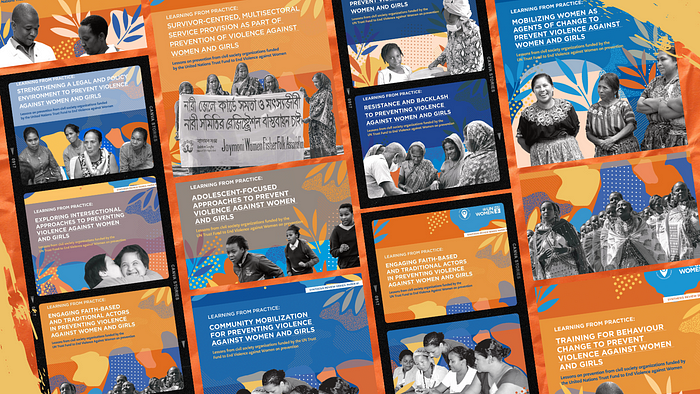“Pathways to Prevention”: Launch of podcast series sharing the experiences of civil society organizations working to end violence against women worldwide

Since November 2021, the UN Trust Fund to End Violence against Women (UN Trust Fund) has been on an exciting journey of learning from the practice of our grantee organizations on preventing violence against women and girls.
Through a series of monthly webinars with over 30 representatives of civil society and women’s rights organizations across the globe, as well as researchers and donors in the field of ending violence against women and girls, we have explored the 10 themes of the Learning from Practice: Prevention Series — a body of practice-based knowledge co-produced with over 100 of our grantees.
This month, we will launch “Pathways to Prevention”, our very first podcast that walks listeners through the 10 themes and bring them to life through the voices of our grantees, without whose contribution the series would have been impossible.
We spoke with Shruti Majumdar, our Monitoring & Evaluation Specialist who worked on this project to disseminate this invaluable knowledge.
Hello Shruti, congratulations on the Prevention series! Perhaps it would be useful if you could introduce some background to the Learning from Practice: Prevention Series?
The UN Trust Fund has been supporting civil society organizations for over 25 years in order to prevent and end violence against women. Over the years, we have amassed an invaluable archive of practice-based knowledge when it comes to initiatives to end violence against women and girls led by civil society organizations, especially women’s rights organizations.
The Learning from Practice series of briefs came about as an effort to systematically extract lessons from this archive of reports, in collaboration with the civil society organizations themselves and external researchers.
Ten themes emerged as critical pathways to prevention, some of which are well documented but some less so. Themes such as dealing with resistance and backlash when working on prevention; designing a good training programme for behaviour change; embedding an intersectional approach; mobilizing women from beneficiaries to agents of change within programmes; engaging adolescents; working with faith and traditional leaders and their entire communities; and finally integrating prevention within programmes for service delivery programmes and within work on advocacy on laws and policies.
We co-produced briefs on each of these themes and that journey of co-production itself has been so invigorating!

We are now preparing the next exciting milestone — the UN Trust Fund’s first podcast. Why a podcast?
Yes, we are very excited about the “Pathways to Prevention” podcast!
We have now published all the briefs and engaged over 3,000 practitioners, researchers and donors through our monthly webinar series. Our ecosystem had also wanted to see this knowledge available in alternative formats like podcasts, videos, etc. What better way to learn about practice-based knowledge than to hear from them directly?
This is an exciting opportunity to go about your day while listening to the podcast and immersing yourself in the voices of practitioners who are doing prevention work every day and talking to each other about it.
Listen in as Sanja from Autonomous Women’s Centre takes you to Serbia and talks about the effectiveness of engaged youth leadership for prevention of violence against women and girls.
Listen in as Kate from Women’s Justice Initiative takes us to communities in Guatemala exploring the power of Indigenous women as community organizers and leaders.
Listen in as Abiy from Episcopal Relief and Development takes us to churches in Liberia and walks us through the journey of transformation of faith-based leaders and their advocacy for violence prevention.
What is the main takeaway that you would encourage our listeners to think about while enjoying this podcast?
When I listen to this podcast, I feel completely transported to the forefront of the work of the practitioners… and it’s a powerful reminder of how complex this work is!
For me, the main takeaway is that the themes they discuss are not necessarily strategies or best practices, so to speak. Rather they are pathways to preventing violence from occurring and re-occurring, pathways which are messy and challenging. Yet there is limited documentation, and this continues to fall through the cracks of research on prevention.
The research on prevention is still predominantly centred on impact and the “what” question, which is really important. But we want to complement this with “how” and “why” questions, the process and mechanisms questions, of how do we get there, how do we effectively prevent violence from occurring?
I would be curious to know how we can carry on these conversations about prevention and ending violence against women and girls as a whole, because exchanging ideas and experience is an integral part of creating a community of practice.
Podcast launch: In September, the UN Trust Fund will launch its eight-part podcast series with “Pathways to Prevention”, which will be available on major listening platforms including Spotify, SoundCloud, Apple Podcasts and Google Podcasts.
Sign up on SHINE to discuss with practitioners and activists working to end violence against women and girls while listening to the podcast, coming later this month.
